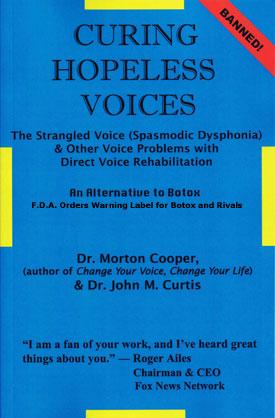Frequently Asked Questions
This document contains Frequently Asked Questions regarding proper voice use, myths of surgery and improper voice use, and outlines a simple technique aimed at helping one improve his or her voice.
Frequently Asked Questions
Introduction
Voice Myths and Beliefs
- I have strained my voice. My friends have told me not to talk louder than a whisper or else I will strain it further. What do you think?
- Why should I work on my speaking voice? Isn’t it the one I was born with?
- Is it possible to have permanent laryngitis?
- I have been told to rest my voice, but I have to talk. What do I do?
- My voice seems to get better as I lose weight. Is there any connection between the two?
- I have been told that posture is the reason I have a bad voice. Is there any truth to that?
- My voice seems to be worse with a change in the weather. What is the connection?
Medicine and Surgery
- I recently read about an experimental voice cord injection technique to help patients with spastic dysphonia. Does it work?
- My doctor tells me I have a growth on my vocal cord called “papilloma.” He advises surgery, but I don’t want surgery. What do you advise?
- I was told I had two growths called “polyps” on my vocal cords. I tried an inhaler, then pills, shots, gargles, voice rest and even bed rest, but all these things failed. What do you recommend?
Introduction
Do people judge a person by his or her voice?
Many people do. Ask them. They make snap judgments about a person simply from what they hear.
Voice is thought to reflect a person’s personality. That isn’t always true because the person may not be using his or her voice correctly, not having had any direction. They may, in fact, be reflecting sounds from family and society.
The well-used voice has a “feel-good” sound. It builds the speaker’s confidence and makes a positive impression on others. A natural, healthy voice can turn lives around.
Can a good voice make you feel better?
Definitely. It gives you assurance that you are “someone” and that people are listening to you, not tuning you out.
Have you noticed during a conversation that people may turn away, forget you, or even ignore you? That may be because your voice isn’t representing you as best it can. It doesn’t get the attention it (and you) deserve. Once you find your natural voice, you may feel better, be more effective, and be listened to.
Voice Myths and Beliefs
I have strained my voice. My friends have told me not to talk louder than a whisper or else I will strain it further. What do you think?
This is a common belief but, in fact, is not true. It’s easy enough to talk softly, but then you are not yourself and you are not using your real voice. More often than not, if you continue whispering or talking softly, you wind up with a serious voice disorder.
First, you need to have your throat checked by a doctor. Then you need to learn how to speak properly and with as much volume and ease as you want. It can be done. In fact, people who were once advised as you were cannot believe that they ever considered such a myth.
Why should I work on my speaking voice? Isn’t it the one I was born with?
This is voice myth. We are all creatures of habit. We get into a voice pattern and stay with it, believing that it is our only option. It is not. I can’t put a voice in you, but I can show you how to bring out your God-given natural voice, one that has star quality. You can have a voice that is richer, fuller, and easier to listen to.
Is it possible to have permanent laryngitis?
Some people think they do, and they think it is the way things have to be. But that’s not necessarily true, because permanent laryngitis doesn’t exist ordinarily. If laryngitis or hoarseness lasts more than two weeks, the individual should see a medical doctor.
So-called “permanent laryngitis” without medical cause merely indicates you are hurting your voice by using it as you do. Nearly all cases of “laryngitis” I have seen are not permanent at all. They are temporary, due to voice misuse and abuse. But continued wrong use of the voice creates a voice that leaves both the patient and listener believing nothing can be done.
I have been told to rest my voice, but I have to talk. What do I do?
If done correctly, you can talk all day long under normal circumstances; your voice should go on and on, clearly and easily. There are exceptions, however.
If you had surgery, you should rest your voice briefly—but not long. If you yelled at a game and went hoarse, you should rest your voice. But if you are misusing your voice, resting it won’t help. Once you start talking again, your voice will tire and continue to bother you. You need to learn how to use your voice properly.
My voice seems to get better as I lose weight. Is there any connection between the two?
The voice may be affected by being overweight. The body may tire, and anything that fatigues the body can affect the voice. Generally, the pitch becomes lower. It is much easier to speak lower as you become fatigued by the excess weight. Breathing becomes harder, so you work harder for breath support—and at the wrong pitch.
Though being overweight can induce a voice problem (or add to an existing one), the weight need not cause or contribute to voice difficulty. It depends upon the individual, the circumstances, and how the voice is used. Weight is but one factor that affects the voice.
I have been told that posture is the reason I have a bad voice. Is there any truth to that?
Posture has very little to do with voice production. The way you move your head, stand, or sit, is of little importance in the correct use of your voice. If you have a bad voice, it is due to incorrect pitch, tone focus, volume, quality, and breathing.
My voice seems to be worse with a change in the weather. What is the connection?
Your emotions, most likely. If you are depressed or morose, the pitch and tone of voice may drop. If you are happy, the voice may rise.
However, some people suffering from allergies are indeed affected by the weather. The voice mechanism may react to pollens and become contained or falter. It needn’t.
Basic Techniques
Okay, how do I begin to improve my voice?
See how DVR can help by following a simple Instant Voice Jiggle Exercise.
Hearing Disorders
My three-year-old son is hard of hearing, and his speech is poor. Should I wait until he is older to help with his speech?
Full question:
My three-year-old son is hard of hearing, and his speech is poor. Friends and associates have suggested that I wait until he is four or five for help with his speech, believing that he might outgrow the problem, at least, partially. I am fearful that I might be wasting valuable time, and hurting his chances for progress. What is your suggestion?
For a child with a hearing handicap, speech therapy (as well as auditory training) is not only appropriate but essential. There is a “speech readiness” period for a child. That is a time when the child develops his speech most fully and most naturally.
The hearing-handicapped child is deprived (to varying degrees) of natural and normal sound stimulation that hearing children have. Therefore, the hearing-handicapped child falls behind in speech ability and development. If you wait until he is four or five, you are allowing time to waste away and the speech readiness period to dissipate.
Your son may outgrow some of his speech problems, but it is not likely, especially with a hearing problem. He needs sound stimulation and speech therapy now.
Can a person who is severely hard of hearing have a normal voice?
A patient of mine from England told me that three almost-deaf voices in her family all have normal voices. They were taught voice as well as speech from early childhood by the school system. In my office, individuals who are severely hard of hearing can be helped to have normal voices, by using the Voice Mirror Machine and hum technique.
Medicine and Surgery
I recently read about an experimental voice cord injection technique to help patients with spastic dysphonia. Does it work?
You are referring to an experimental procedure used in some hospitals, whereby the patient’s vocal cord is injected with botulinum, an invasive toxic substance. Botulinum is a diluted form the deadly botulism.
The downside and side effects affecting the body, as well as the vocal cord, are not fully known. The procedure causes a temporary parasis or paralysis rather than a permanent paralysis of the vocal cord and generally involves repeated doses for life. It was orignally thought that the injection would last nine months, but the period may be reduced to six months, three months, or six weeks.
In the December, 1999 National Spasmodic Dysphonia Association Newsletter, page 7, Dr. Gerald Berke, Chairman of UCLA Head and Neck Division, reports regarding Botox (botulinum toxin):
…there are some obvious drawbacks. It requires lifelong visits from 4 to 10 times per year for repeat injections. The injections are not inexpensive. The interval between post injection breathiness, good voice, and the return of symptoms may not be very long in some patienst. Hypersensitivity and antibody formation have been shown to produce some long term structural changes in muscle cells.
You may learn more about Botox in my personal story as well as a letter from a patient.
My doctor tells me I have a growth on my vocal cord called “papilloma.” He advises surgery, but I don’t want surgery. What do you advise?
Vocal misuse and abuse, I have found, may contribute to the onset and development of the kind of growth you have. In 1971 at UCLA Medical Center, my study revealed that within a period of three months, 4 out of 8 patients with biopsied papillomata of the vocal cords either reduced or eliminated the growths through Direct Voice Rehabilitation—change of pitch, tone focus, breathing, and voice hygiene. These findings were published in the Journal of Speech and Hearing Disorders.
Learn more about Papillomatosis.
I was told I had two growths called “polyps” on my vocal cords. I tried an inhaler, then pills, shots, gargles, voice rest and even bed rest, but all these things failed. What do you recommend?
Polyps are benign growths on the vocal cords. Surgery can remove polyps, but since voice misuse—the wrong pitch, quality, volume, and placement of the voice—often creates them, it is essential you learn how to use your speaking voice.
These growths have responded extremely well to voice therapy, but if you choose not to learn correct voice usage, you will most likely continue to experience voice difficulty. My advice is to change the way you are using your voice.
Learn more about Polyps and Nodules.
Voice Disorders 101
Free Downloads
Curing Hopeless Voices
The Strangled Voice (Spasmodic Dysphonia) & Other Voice Problems with Direct Voice Rehabilitation
By Dr. Morton Cooper & Dr. John M. Curtis
One Lone Courageous Doctor
Curing Strangled Voices (SD) Spasmodic Dysphonia vs The New York Times and The Entire Medical Establishment Guaranteeing No Cures
By Dr. Morton Cooper
Video Library
Dr. Cooper has an extensive library of videos, including documented cures & recoveries of SD as well as media appearances.



